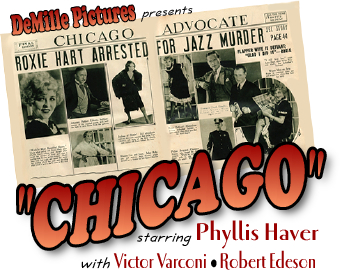

Roxie Hart is adored by her husband Amos, who co-owns a cigar stand in Chicago, but she is dissatisfied with their meager existence in a small apartment. When she meets with her "sugar daddy" while Amos is at work, she milks said sugar daddy for expensive clothes and other costly items her husband cannot provide. Sugar Daddy finally tires of her dipping into his deep pockets and decides to leave her; he roughly pushes her away despite her pleas and, as he walks out the door of the apartment, she shoots and kills him in a fit of temper.
She calls Amos, who runs home and, to save his wife, agrees
to say he shot a burglar. The police, however, quickly figure
out the real story, and Roxie begs that she not be hanged. She
quickly 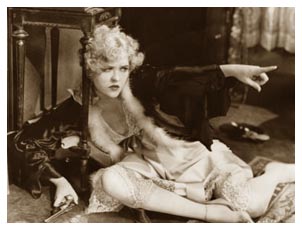 arises from her despair, however,
when a cocky reporter who is at the scene tells her he'll make
her famous and drum up sympathy by portraying her as the most
beautiful murderess in the city. Totally oblivious to the seriousness
of her deed, she is soon posing happily for photos with the police
while her husband sits in agony over the whole sordid affair.
arises from her despair, however,
when a cocky reporter who is at the scene tells her he'll make
her famous and drum up sympathy by portraying her as the most
beautiful murderess in the city. Totally oblivious to the seriousness
of her deed, she is soon posing happily for photos with the police
while her husband sits in agony over the whole sordid affair.
In jail, Roxie cuts out all the newspaper stories about her and delights in the publicity she is getting. In the meantime, Amos solicits the services of Chicago's most famous defense lawyer, Billy Flynn. Unfortunately, when the three of them meet in the jail, Flynn announces he will do nothing without a $5,000 fee up front. Amos is able to raise $2,500 by the next day, but when he delivers it to Flynn's house, Flynn refuses to provide his services without the entire $5,000. Amos vows to have the money by the next day, but comes back to Flynn's house that evening and steals not only the $2,500 he gave Flynn, but a large sum of stashed-away blood money as well. He is almost caught but, after a struggle with the butler, he manages to escape and pays Flynn the next day.
Flynn defends Roxie, dressing her for the part of innocent victim and coaching her on how to act in the courtroom. Roxie, however, has other plans for winning over the all-male jury, mostly by flirtatious looks and exposing lots of leg.
When the jury finds her innocent, there is an uproarious celebration in the courtroom, but it is short-lived. Shots are fired in the hallway. Another murderess has shot a boyfriend. Suddenly, Roxie becomes old news.
Originally a Broadway play, "Chicago" was written by Maurine Dallas Watkins, a former newspaper writer who had covered a murder committed by housewife Beulah Sheriff Annan in 1924. Like Roxie Hart, Annan shot her lover in her apartment. She based Billy Flynn on mob lawyer William W. O'Brien, Annan's attorney, who did win an acquittal for his client using much the same tactics parodied in "Chicago." After quitting the newspaper business, Watkins wrote "Chicago," which opened Dec. 30, 1926, at the Music Box Theatre on Broadway and ran for 172 performances.
The 1927 film adaptation had long been thought lost, but a pristine print of "Chicago" was found in Cecil B. DeMille's vault - and what a find it proved to be! Over the years, other presumably lost films have garnered more interest (Lon Chaney's "London After Midnight" being the Holy Grail for silent film aficionados); however, this film has been making the rounds throughout the country to rave responses from those lucky enough to see it. That several remakes have hit the movie screens in ensuing years may account for the erstwhile obscurity of this film; but now that it has come to light, most agree it is likely the best version of the Maurine Watkins story ever made. It's certainly a superb film in its own right.
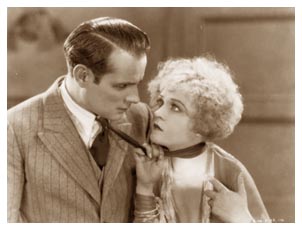 The film is so good, in fact, that
most discussion seems to center on how much of DeMille's hand
is in the direction since it was produced by the DeMille Pictures
Corporation. Frank Urson, officially listed as the director, has
some estimable credentials: he worked with Thanhouser and Fine
Arts, mainly as a cinematographer, and also worked under such
talents are Marshall Neilan and James Cruze before going to DeMille.
Urson served for several years as an assistant director to DeMille
on such fine films as "The Roaring Road" (1919), "The
Road to Yesterday" (1925), "The Volga Boatman"
(1925), and, almost simultaneously with "Chicago," on
"King of Kings" (1927). However, Urson can't lay claim
to any other great achievements as director, and the quality of
"Chicago" suggests a more talented director's hand.
The film is so good, in fact, that
most discussion seems to center on how much of DeMille's hand
is in the direction since it was produced by the DeMille Pictures
Corporation. Frank Urson, officially listed as the director, has
some estimable credentials: he worked with Thanhouser and Fine
Arts, mainly as a cinematographer, and also worked under such
talents are Marshall Neilan and James Cruze before going to DeMille.
Urson served for several years as an assistant director to DeMille
on such fine films as "The Roaring Road" (1919), "The
Road to Yesterday" (1925), "The Volga Boatman"
(1925), and, almost simultaneously with "Chicago," on
"King of Kings" (1927). However, Urson can't lay claim
to any other great achievements as director, and the quality of
"Chicago" suggests a more talented director's hand.
Scott Eyman, who has authored the newest DeMille bio - "Empire of Dreams: The Epic Life of Cecil B. DeMille" - said production notes definitely identify three days when DeMille served as director for the film, though which three days or which part of the production is unknown. In the January 1928 Picture Play magazine, columnists Edwin and Elza Schallert affirmed that "It has been done with much secrecy, but the facts will out (sic). Cecil B. DeMille is directing 'Chicago,' the film based on the famous stage satire on the farcical way in which murder trials are sometimes conducted. DeMille's name, however, probably won't be mentioned on the scrren when the picture is released, except as general supervisor. He became so interested in the story during its preparation that he couldn't resist the temptation to make it himself. So, when 'Chicago' comes to the screen, you will know the reason if it seems to be replete with the famous DeMille touches."
Additionally, in the February 1927 issue of Motion Picture magazine, an article on the movie details the writer's interview with Victor Varconi on the set. Suddenly, the interview is cut short when an unnamed assistant director rushes up to Varconi and says, "They are waiting for you on the set! Hurry!" Varconi then turns to the interviewer and says, "Mr. DeMille must have come onto the set. I do not see why people are so afraid of him. He is the very nicest person in the world!" Not proof positive that DeMille was the director, but it is interesting that Frank Urson is not mentioned once in the entire article.
Liberty magazine (February 18, 1928) added, "DeMille's film is exceedingly well-directed. Frank Urson gets the screen credit as director, but Hollywood whispers that DeMille felt that he might hurt the reception of his 'The King of Kings' by admitting a personal hand in the production of 'Chicago'."
Regardless of whoever may be responsible for the final product, we have a wonderfully entertaining film highlighted by the performances of the main players.
Any panegyric about Phyllis Haver's performance finally
would amount to understatement, for no other actress from the
period could have equaled her portrayal of Roxie Hart. When the
boyfriend (well played by Eugene Pallette) comes to visit, she
sits in "Daddy's" lap and in a very cutesy bit of business,
reveals hundreds of dollars of purchases she has made for clothes
and 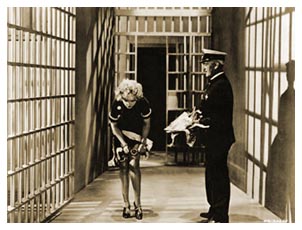 charged to him. The cuddling, stroking
and even playfully biting his ear don't work, though: he angrily
pushes her so hard that she hits the wall and lands on the floor,
knocking over a table in the process. Suddenly, Roxie's volcanic
temper flares, and as he is about to close the door to leave,
she notices Amos's gun that has fallen from the overturned table.
She fires it at the door, and the boyfriend falls back into the
apartment dead. When the police arrive, she cowers with terror
(not remorse, mind you) at her fate and pleads, "Don't let
them hang me! Don't let them hang me!"
charged to him. The cuddling, stroking
and even playfully biting his ear don't work, though: he angrily
pushes her so hard that she hits the wall and lands on the floor,
knocking over a table in the process. Suddenly, Roxie's volcanic
temper flares, and as he is about to close the door to leave,
she notices Amos's gun that has fallen from the overturned table.
She fires it at the door, and the boyfriend falls back into the
apartment dead. When the police arrive, she cowers with terror
(not remorse, mind you) at her fate and pleads, "Don't let
them hang me! Don't let them hang me!"
Haver's superb characterization, by turns naïve and calculating, lights up the screen throughout the film. She's a delightfully clueless blonde in jail, not pondering her possible fate but instead poring over the many newspaper articles she has cut out about her, crowing "Seventeen columns and twenty-three pictures!" She is splendid in her scenes with Robert Edeson as slick defense attorney Billy Flynn, both prior to going into the courtroom and during the courtroom scene. Again, as Flynn is coaching her to be demure and retiring and to "droop" to express sadness, she remains the gum-popping, self-assured flapper who continues to believe she can use her feminine wiles to get out of any jam, including murder.
We've seen her in somewhat revealing nightwear and typical
1920's tight, short dress thus far in the film; however, Flynn
has her in an almost comical pink (yes, it's a black and white
movie, but the story tells us it's pink) dress, billowing chiffon
and looking as if she is the personification of simpering innocence
on her way to church. Both the outfit and the poses she strikes
on cue will remind sharp-eyed viewers of Marion Davies' Peggy
Pepper in the first few minutes of King Vidor's "Show People"
(1928). She even caresses a bouquet of flowers as she enters the
courtroom.
Fortunately for her, the jury is all male, and Roxie quickly makes
the most of this fortunate circumstance, pulling back the chiffon
well above the knee. Although not a word is spoken by any of the
jury, their mesmerized faces say everything.
New York Times critic Mordaunt Hall touted Haver's performance noting, "Phyllis Haver . . . gives an astoundingly fine performance as the redoubtable Roxie Hart. . . (She) brings to the part all the happy-go-lucky expressions one would expect from a girl of Roxie Hart's type."
Variety said, "Miss Haver makes of Roxie a mincing, pouting, snarling dame who is all dame; nothing more and nothing less. A good piece of work."
"Praise be, Miss Haver made no attempt to sugar the role. Roxie remains a heartless, tawdry little Jezebel," said Liberty magazine.
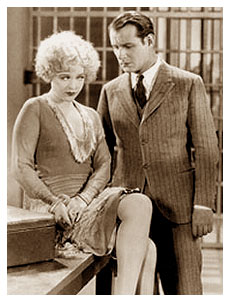 Haver was rightfully proud of her
work in "Chicago." In a Feb. 26, 1928, article in the
Los Angeles Times, she said of the Roxie Hart role, "Did
I enjoy her? Of course, but she kept me jumping. I don't believe
I have ever worked so hard on a single person as I did on Roxie,
but then of course, I consider her the best characterization I
have ever had."
Haver was rightfully proud of her
work in "Chicago." In a Feb. 26, 1928, article in the
Los Angeles Times, she said of the Roxie Hart role, "Did
I enjoy her? Of course, but she kept me jumping. I don't believe
I have ever worked so hard on a single person as I did on Roxie,
but then of course, I consider her the best characterization I
have ever had."
In the stage version, hubby Amos Hart is a milksop in a minor role and appearing only at the beginning of the play. His role was expanded considerably for the film, and Hugarian-born Victor Varconi is a revelation, as he is in DeMille's "The Volga Boatman." Watch the adoration on his face when he rings Roxie's garter (Don't ask questions, just buy the DVD!) segueing to disappointment as he then confronts a sink of dirty dishes. When the police arrive at the apartment, Amos claims responsibility for the shooting saying he was protecting his home from a burglar. The police easily separate the two, tell Roxie that Amos pinned the deed on her, and, of course, she runs out to blast her husband for squealing, which he didn't do. If Haver is all pinwheels and Roman candles in her fury, Varconi underplays, generating compassion for Amos's quiet, desperate devotion that sadly grows into disillusionment.
Before the police take her away from the scene of the crime, a sensation-seeking newspaper reporter (the ubiquitous T. Roy Barnes) tells her not to worry: he'll portray her in the press as Chicago's most beautiful murderess and elicit the necessary sympathy that will get her acquitted. As Roxie is primping, having her photo taken with the police and generally enjoying the attention, Amos sits on the bed in the next room watching this display with a combination of disgust, disappointment and desperation, all equally registered in Varconi's face. We're seeing two great performances playing off each other - Haver's diamond-hard calculation and Varconi's agonized devotion, heightening the film's sustained tension.
The next day, Amos brings famous defense lawyer Billy Flynn to the jail. When Flynn announces he must have $5,000 in advance to take the case, Roxie makes it clear that humble cigar-stand owner Amos will get the money if he loves her, another example of how Roxie remains out of touch with reality. But the ever-faithful Amos blindly vows he will find some way to pay the outrageous fee. (Note: The average per capita income for gainfully employed citizens in 1927 was $2,010. Source: 1927: High Tide of the Twenties by Gerald Leinwand)
It must be noted here, too, that Robert Edeson's characterization
of Billy Flynn is a wonderful performance: aloof and self-assured,
dressed to the nines as he puffs his cigar and leans on his cane.
However, Flynn is unscrupulous, too, cynically using the system
for his financial aspirations and bleeding poor drudges such as
Amos Hart for those gains.
Edeson, however, really gets his chance to shine in his scenes
with Haver immediately before and during the trial. In a room
at the courthouse just prior to entering the courtroom, Flynn
tries to recount all of his instructions for the trial to an uncooperative
Roxie. She proves to be a difficult pupil by having her own ideas
about how she should act during the trial. Just as they are about
the leave the room, the tension between the two reaches its height,
so much so that Flynn raises his hand to strike her, with Roxie
coming back at him in an equally aggressive manner. Just as the
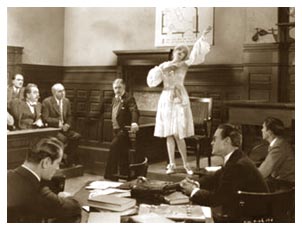 two are about to tangle, the bailiff
opens the door to the crowded courtroom to bring them in. The
position of the two about to enter battle is suddenly transposed
from a hand raised in anger to a hand raised to heaven pleading
for mercy for this innocent young child - and Roxie is positioned
perfectly to lay her head on his chest as if seeking comfort so
that this is the scene the hundreds of people in the courtroom
see as the door is opened - not the vitriolic display of seconds
before.
two are about to tangle, the bailiff
opens the door to the crowded courtroom to bring them in. The
position of the two about to enter battle is suddenly transposed
from a hand raised in anger to a hand raised to heaven pleading
for mercy for this innocent young child - and Roxie is positioned
perfectly to lay her head on his chest as if seeking comfort so
that this is the scene the hundreds of people in the courtroom
see as the door is opened - not the vitriolic display of seconds
before.
On the stand, Amos continues to come to his wife's defense much better than Flynn or anyone else could have anticipated (Roxie's note to Flynn: "He's a cinch!"). When the tough prosecution lawyer asks if Mrs. Hart, in her nightclothes, was properly dressed to receive guests that morning (referencing the boyfriend), Amos coolly replies that her dress is proof that the visit was unexpected and unwanted. At no time does the prosecutor succeed in advancing his case past Amos's responses. Throughout the trial, as Amos watches the proceedings, Varconi portrays a man who is anxiously concerned for his wife, as well as in love with her, at once being the doting husband, but remaining strong and unintimidated.
Flynn's closing argument to the jury, which goes on for hours, is a tour de force for the semaphoric Edeson. He harangues the jury until they are drooping from exhaustion - and, thankfully, Roxie reacts which a variety of emotions right on cue as Flynn reaches various points in his speech.
Variety praised both Varconi and Edeson saying, "Victor Varconi stands out as the husband . . ." and "Robert Edeson turns in a sterling performance. . ." The New York Times said, "Victor Varconi is excellent in the role of the husband of the wind-blown city's chief blonde. Robert Edeson is capital as the mercenary lawyer who, as a price, does all he can in his own way to save his client from the gallows."
Without revealing the final scenes and the fate of Amos and Roxie, mention should be made of a subplot that very neatly figures into the storyline.
At the beginning of the film, the cleaning girl at the apartment building (played by Virginia Bradford) speaks to Amos in the hallway as he is leaving for work on that fateful first day. She makes her admiration of Amos very evident to the viewer, although it appears Amos does not realize her attraction for him. However, he regularly gives her cigar coupons to exchange for gifts. She shows him one of these - a pocket watch - and she is careful to thank him profusely for his kindness. He has a few more coupons in his pocket that he gives her before rushing off to work.
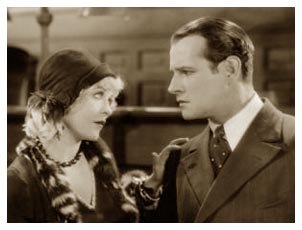 Now back to the end of the film.
After the trial - and before Roxie and Amos return home - two
detectives are searching the apartment for Flynn's stolen money,
and the cleaning girl comes in as they are conducting their search.
Remember that there was more money in Flynn's secret hiding place
than the $2,500 Amos had given him. Amos had hidden the money
in a flowerpot back at the apartment. Does the cleaning girl know
about the hidden loot? Will she turn Amos in?
Now back to the end of the film.
After the trial - and before Roxie and Amos return home - two
detectives are searching the apartment for Flynn's stolen money,
and the cleaning girl comes in as they are conducting their search.
Remember that there was more money in Flynn's secret hiding place
than the $2,500 Amos had given him. Amos had hidden the money
in a flowerpot back at the apartment. Does the cleaning girl know
about the hidden loot? Will she turn Amos in?
With that, we'll stop the commentary on the storyline and suggest you get the DVD to see a great, unsparing film with a most satisfying conclusion.
The film was almost universally praised by all of the major publications, and it did show a profit for DeMille's company. "The picture dashes along with considerable wit and occasional splashes of tragedy and pathos," said the New York Times critic. Photoplay praised everyone from scenarist Lenore Coffee to Urson and DeMille and all of the performers, adding, "[B]ut, after all, the picture belongs to Phyllis Haver who gives a marvelous characterization. . . Of course, nobody will miss seeing 'Chicago'."
Others such as Variety, Picture Play magazine, and Motion Picture magazine, among others, liked the film, but cited various "flaws" of overacting by Haver in need of "substantial cutting room attention" - comments that, in retrospect, are certainly not the consensus of audiences now. Just watch her final scenes, drenched with Expressionist shadows, to see quiet acting of the highest order.
"Chicago" has been released in yet another standard-vaulting two-disc box set from Flicker Alley, produced by Jeffery Masino and David Shepard. The high-definition transfer, taken from a 2006 UCLA Film and Television Archive restoration, may well be the best ever seen of a silent film, rivaled only by Kino's Blu-Ray of Keaton's "The General" (1926). Has such a deep, rich palette of greys and blacks ever looked so satisfying on home video? But there's an equally praiseworthy complement, for Rodney Sauer leads the Mont Alto Motion Picture Orchestra in a perfectly timed accompaniment, by turns witty and suspenseful. Bonus features include three documentaries: "The Golden Twenties" (1950), a compilation of news footage from the decade; the Oscar-winning "The Flapper Story" (1985), an exhilarating record of Jazz Babies looking back some sixty years at their young days; and a most interesting supplement, "Chicago: The Real Roxie Hart," by Jeffery Masino and Silas Lesnick, based on research by David Pierce. An enclosed brochure features an essay by Thomas Pauly on author Maurine Watkins and the factual background of "Chicago," as well as notes by DeMille authority Robert S. Birchard, whose study "Cecil B. DeMille's Hollywood" should be part of any silent film fan's library.
Are we talking embarrassment of riches here? Are we talking
Christmas in July? Are we talking the bee's knees? Ohhh: are we
talking up a storm!
Copyright 2010 by Dean Thompson and Tim Lussier. All rights reserved.